高一英语人教版下册
- 格式:ppt
- 大小:710.00 KB
- 文档页数:11
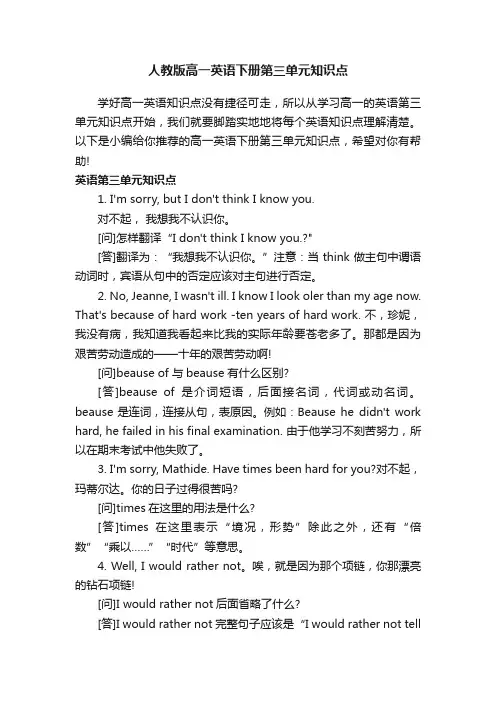
人教版高一英语下册第三单元知识点学好高一英语知识点没有捷径可走,所以从学习高一的英语第三单元知识点开始,我们就要脚踏实地地将每个英语知识点理解清楚。
以下是小编给你推荐的高一英语下册第三单元知识点,希望对你有帮助!英语第三单元知识点1. I'm sorry, but I don't think I know you.对不起,我想我不认识你。
[问]怎样翻译“I don't think I know you.?"[答]翻译为:“我想我不认识你。
”注意:当think做主句中谓语动词时,宾语从句中的否定应该对主句进行否定。
2. No, Jeanne, I wasn't ill. I know I look oler than my age now. That's because of hard work -ten years of hard work. 不,珍妮,我没有病,我知道我看起来比我的实际年龄要苍老多了。
那都是因为艰苦劳动造成的——十年的艰苦劳动啊![问]beause of 与beause有什么区别?[答]beause of是介词短语,后面接名词,代词或动名词。
beause是连词,连接从句,表原因。
例如:Beause he didn't work hard, he failed in his final examination. 由于他学习不刻苦努力,所以在期末考试中他失败了。
3. I'm sorry, Mathide. Have times been hard for you?对不起,玛蒂尔达。
你的日子过得很苦吗?[问]times在这里的用法是什么?[答]times在这里表示“境况,形势”除此之外,还有“倍数”“乘以……”“时代”等意思。
4. Well, I would rather not。
唉,就是因为那个项链,你那漂亮的钻石项链![问]I would rather not后面省略了什么?[答]I would rather not完整句子应该是“I would rather not tellyou"。
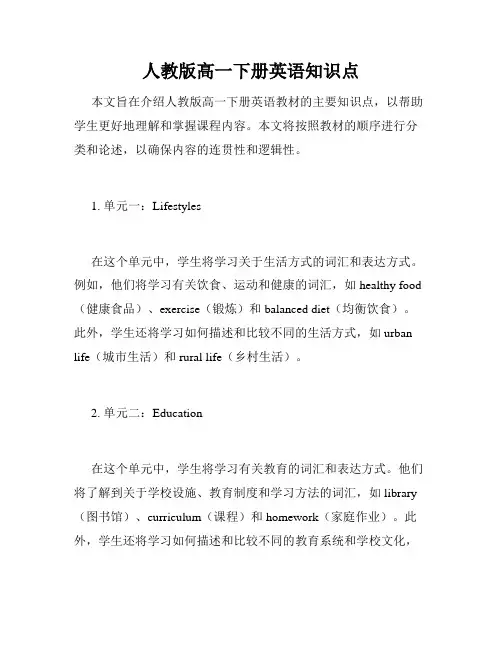
人教版高一下册英语知识点本文旨在介绍人教版高一下册英语教材的主要知识点,以帮助学生更好地理解和掌握课程内容。
本文将按照教材的顺序进行分类和论述,以确保内容的连贯性和逻辑性。
1. 单元一:Lifestyles在这个单元中,学生将学习关于生活方式的词汇和表达方式。
例如,他们将学习有关饮食、运动和健康的词汇,如healthy food (健康食品)、exercise(锻炼)和balanced diet(均衡饮食)。
此外,学生还将学习如何描述和比较不同的生活方式,如urban life(城市生活)和rural life(乡村生活)。
2. 单元二:Education在这个单元中,学生将学习有关教育的词汇和表达方式。
他们将了解到关于学校设施、教育制度和学习方法的词汇,如library (图书馆)、curriculum(课程)和homework(家庭作业)。
此外,学生还将学习如何描述和比较不同的教育系统和学校文化,如Chinese education system(中国教育制度)和British education system(英国教育制度)。
3. 单元三:Technology在这个单元中,学生将学习关于科技的词汇和表达方式。
例如,他们将学习有关电子设备、互联网和社交媒体的词汇,如smartphone(智能手机)、online shopping(网上购物)和social networking site(社交网络网站)。
此外,学生还将学习如何描述和讨论科技对生活和社会的影响,如advantages and disadvantagesof technology(科技的优缺点)。
4. 单元四:Global Issues在这个单元中,学生将学习有关全球问题的词汇和表达方式。
例如,他们将学习有关环境污染、气候变化和贫困的词汇,如pollution(污染)、climate change(气候变化)和poverty(贫困)。
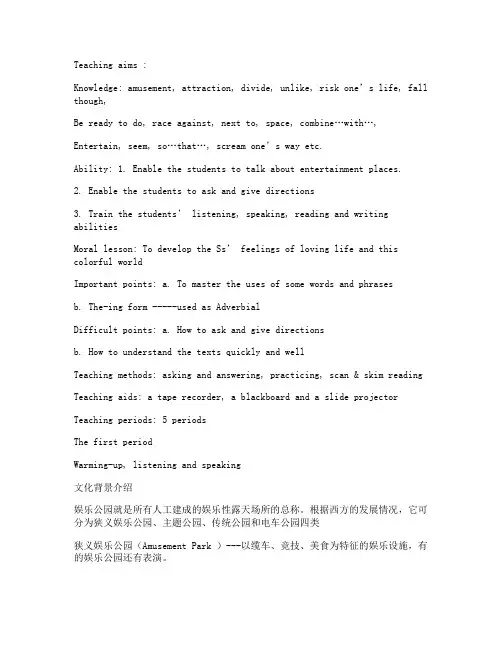
Teaching aims :Knowledge: amusement, attraction, divide, unlike, risk one’s life, fall though,Be ready to do, race against, next to, space, combine…with…,Entertain, seem, so…that…, scream one’s way etc.Ability: 1. Enable the students to talk about entertainment places.2. Enable the students to ask and give directions3. Train the students’ listening, speaking, reading and writingabilitiesMoral lesson: To develop the Ss’ feelings of loving life and this colorful worldImportant points: a. To master the uses of some words and phrasesb. The-ing form -----used as AdverbialDifficult points: a. How to ask and give directionsb. How to understand the texts quickly and wellTeaching methods: asking and answering, practicing, scan & skim readingTeaching aids: a tape recorder, a blackboard and a slide projectorTeaching periods: 5 periodsThe first periodWarming-up, listening and speaking文化背景介绍娱乐公园就是所有人工建成的娱乐性露天场所的总称。
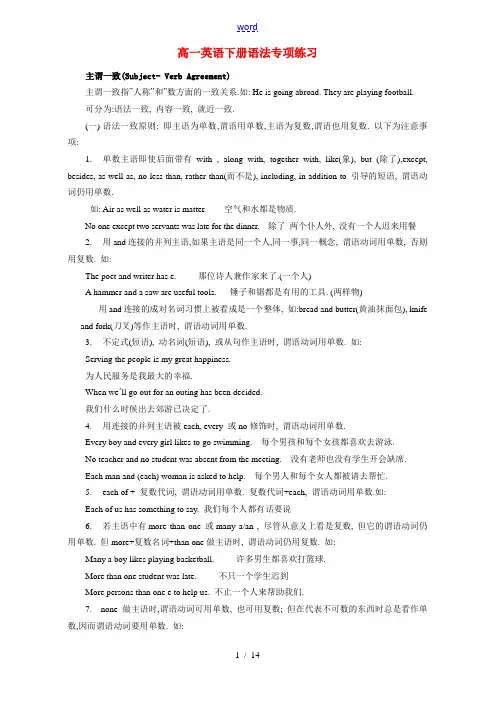
高一英语下册语法专项练习主谓一致(Subject- Verb Agreement)主谓一致指”人称”和”数方面的一致关系.如: He is going abroad. They are playing football.可分为:语法一致, 内容一致, 就近一致.(一)语法一致原则: 即主语为单数,谓语用单数,主语为复数,谓语也用复数. 以下为注意事项:1.单数主语即使后面带有with , along with, together with, like(象), but (除了),except, besides, as well as, no less than, rather than(而不是), including, in addition to 引导的短语, 谓语动词仍用单数.如: Air as well as water is matter. 空气和水都是物质.No one except two servants was late for the dinner. 除了两个仆人外, 没有一个人迟来用餐2.用and连接的并列主语,如果主语是同一个人,同一事,同一概念, 谓语动词用单数, 否则用复数. 如:The poet and writer has e. 那位诗人兼作家来了.(一个人)A hammer and a saw are useful tools. 锤子和锯都是有用的工具. (两样物)用and连接的成对名词习惯上被看成是一个整体, 如:bread and butter(黄油抹面包), knife and fork(刀叉)等作主语时, 谓语动词用单数.3.不定式(短语), 动名词(短语), 或从句作主语时, 谓语动词用单数. 如:Serving the people is my great happiness.为人民服务是我最大的幸福.When we’ll go out for an outing has been decided.我们什么时候出去郊游已决定了.4.用连接的并列主语被each, every 或no修饰时, 谓语动词用单数.Every boy and every girl likes to go swimming. 每个男孩和每个女孩都喜欢去游泳.No teacher and no student was absent from the meeting. 没有老师也没有学生开会缺席.Each man and (each) woman is asked to help. 每个男人和每个女人都被请去帮忙.5.each of + 复数代词, 谓语动词用单数. 复数代词+each, 谓语动词用单数.如:Each of us has something to say. 我们每个人都有话要说6.若主语中有more than one 或many a/an , 尽管从意义上看是复数, 但它的谓语动词仍用单数. 但more+复数名词+than one做主语时, 谓语动词仍用复数. 如:Many a boy likes playing basketball. 许多男生都喜欢打篮球.More than one student was late. 不只一个学生迟到More persons than one e to help us. 不止一个人来帮助我们.7. none 做主语时,谓语动词可用单数, 也可用复数; 但在代表不可数的东西时总是看作单数,因而谓语动词要用单数. 如:None of us are (is) perfect. 人无完人.None of this worries me. 这事一点不使我着急.8. 名词如: trousers, scissors, clothes, goods, glasses 等作主语时, 谓语动词必须用复数. 如:His clothes are good. 但这些名词前若出现a pair of , 谓语一般用单数.如:A pair of glasses is on the desk. 桌上有一副眼镜.9. 形复意单名词如:news ; 以ics 结尾的学科名称如: physics, mathematics, economics; 国名如: the United States; 报纸名如: the New Times; 书名如: Arabian Night <天方夜谈>; 以及The United Nations<联合国> 等作主语时, 谓语动词用单数.10. “a +名词+and a half “, “one and a half + 名词”, “the number of + 名词”等作主语时, 谓语动词要用单数. 如:Only one and a half apples is left on the table.注意: one or two + 复数名词作主语, 谓语动词用复数形式, 如:One or two places have been visited. 参观了一两个地点.(二) 内容一致原则:1.主语中有all, half, most, the rest等, 以及”分数或百分数+名词”:The rest of the bikes are on sale today. 剩下的自行车, 今天出售.60%of the apple was eaten by little boy. 这个苹果的60%都被这个小男孩吃了.Most of the apples were rotten. 大部分的苹果都是烂的.Most of the apple was eaten by a rat. 这个苹果的大部分被老鼠吃了.2. 不定数量的词组, 如:part of , a lot of , lots of , one of , a number of , plenty of等作主语时, 谓语动词的单复数取决于量词后面名词的数.如:A part of the textbooks have arrived. 一小部分教科书已运到.A part of the apple has been eaten up by the pig. 这个苹果的一部分被猪吃光了.3. 加减乘除用单数.如:Fifteen minus five is ten . 15减去5等于10.4. 表示时间, 金钱, 距离, 度量等的名词做主语时, 尽管是复数形式, 它们做为一个单一的概念时, 其谓语动词用单数.如:Ten miles is a good distance. 十英里是一个相当的距离.5. (1) 通常作复数的集体名词. 包括police , people, cattle 等, 这些集体名词通常用作复数.如:The British police have only very limited powers.(2) 通常作不可数名词的集体名词. 包括equipment, furniture, clothing, luggage 等.(3) 可作单数也可作复数的集体名词. 包括audience, mittee, government, family, enemy, group, party, team, public 等.如:The mittee has/have decided to dismiss him. 委员会决定解雇他.6. the +形容词/过去分词形式”表示一类人或事物, 作主语时, 谓语动词用复数.如:The injured were saved after the fire.(三) 就近原则1. 由here, there, where 等引导的倒装句中, (有时主语不止一个时)谓语动词与靠近它的主语在数上一致.如:Here es the bus 公共汽车来了.Here is a pen and some pieces of paper for you. 给你一支钢笔和几X纸Where is your wife and children to stay while you are away?你不在这儿的时候, 你爱人和孩子在哪儿呆呢?2. 用连词or, either.... or, neither….nor, not only….but also 等连接的并列主语, 谓语动词与靠近它的主语在数上一致. 如:Neither the students nor the teacher knows anything about it 学生和老师都不知道这事.He or you have taken my pen. 他或你拿了我的钢笔.注意: one of +复数名词+who/that/which 引导的定语从句中, 定语从句的动词为复数.如: Mary is one of those people who keep pets. 玛丽是饲养宠物者之一.The only one of +复数名词+ who/that./which 引导的定语从句中,定语从句的动词应为单数.Mary is the only one of those people who keeps pets. 玛丽是唯一一个饲养宠物的人.主谓一致练习1. About 60 percent of the students _____ from the south, the rest of them _____ from the north and foreign countries.A. are/isB. are/areC. is/areD. are2. Half of the workers here _____ under 30 _____.A. is/yearsB. are/year oldC. is/years oldD. are/years of age3. Now Tom with his classmates _____ football on the playground.A. playB. are playingC. playsD. is playing4. The number of pages in this dictionary _____ about two thousand.A. areB. hasC. haveD. is5. Thirty dollars _____ too expensive.A. areB. isC. wereD. be6. The audience _____ so large that no seat was left unoccupied in the great hall.A. isB. areC. wasD. has7. The secretary and principal _____ at the meeting now.A. are speakingB. is speakingC. were making a speechD. have a speech8. "If anybody _____, please put down _____ name," said the teacher to the monitor.A. wants to buy the book/hisB. want to buy the book/theirC. will buy the book/one'sD. wants to have the book bought/her9. Nothing but one desk and six chairs _____ in the room.A. areB. is stayedC. isD. are left10. Having arrived at the station, _____.A. it was found that the train had leftB. the train had leftC. the train was found leftD. he found that the train had left11. Between the two roads _____ a TV tower called "SkyscraperTower".A. standsB. standingC. which standsD. stand12. Either of you _____ going there tonight.A. willB. wasC. isD. are13. You as well _____ right.A. I areB. I amC. as I amD. as I are14. All but Dick _____ in Class Three this term.A. areB. isC. wereD. was15. -- Shall I wait here for three hours?--Yes. Three hours _____ to wait for such a doctor.A. are not very long for youB. is not long enough for youC. was not long enough for youD. will be too long for you16. Where to get the materials and how to get them _____ at the meeting.A. have not discussedB. have not been discussedC. has not discussedD. has not been discussed17. I took mathematics and physics because I think that _____ very important for me to make further research in this field.A. what isB. they areC. thisD. which are18. Every student and every teacher _____.A. are going to attend the meetingB. have attended the meetingC. has attended the meetingD. is attended the meeting19. Three fourths of the bread _____ by Bob, and the rest of the bread _____ left on the table.A. was eaten/wereB. were eaten/wasC. were eaten/wereD. was eaten/was20. This pair of shoes _____.A. is herB. is hersC. are hersD. are her21.There ______ no life on the moon.A. is said to haveB. are said to haveC. is said to beD. are said to be22.A group of ______ are eating ______ and ______ at the foot of the hillA. sheep; grass; leavesB. sheeps grasses leavesC. sheep; grass leafD. sheeps grass leafs23.My family raise a lot of _______, including two______.A. cattles cowsB. cows cattleC. cattle cowsD. cow, cattles24.What he says and what he does_______.A. does not agreeB. do not agreeC. does not agree withD. not agree25.The boy and the girl each ______ toys.A. have their ownB. has their ownC. have her ownD. has her own26.She is the only one among the ______ writers who ______stories for children.A. woman, writesB. women writeC. women writesD. woman write27.The railway station is ______from our school.A. two hour`s driveB. two hours` driveC. two hour driveD. two hours drive28.Mike and John`s ______.A. father is a teacherB. fathers are teachersC. father are teachersD. fathers are teacher29.A great deal of talking and listening that ______ under casual circumstance may seem to be aimless.A. is occurredB. are occurredC. occursD. occur30._______ the classroom needs to be cleaned.A. Either the offices orB. The offices andC. Both the office andD. The office and31.Three-fourths of the homework ______today.A. has finishedB. has been finishedC. have finishedD. have been finished32.More than 60 percent of the world’s radio programmes ______in England.A. isB. wasC. areD. be33. ______work has been done to improve the people`s living standard34.The rest of the magazines ______ within half an hour.A.is sold outB.are sold outC.was sold outD.were sold out35.There ______ a lot of sugar in the jar.36. “All ______present and all ______going on well”, our monitor said.A.is isB.are, areC.are isD.is are37.Yesterday the League secretary and monitor ______ asked to make a speech at the meeting.A.isB.wasC.areD.were.38.Mary as well as her sisters ______ Chinese in China.39.The rich______ not always happy.40. ______can be done ______done.A.All, have beenB.All that ,have beenC.All hasD.All that ,has been41.Either of the plans ______equally dangerous.42.The police ______the murderer everywhere when he suddenly appeared in a theatre.A.is searchingB.were searching forC.are searchingD.was searching for43.Your trousers ______dirty, you must have______ washed.A.is itB.are itC.are themD.is them44.The Olympic games ______held every four ______.A.is yearsB.are yearsC.is yearD.are year45.He is the oly one of the students who______elected.46. ______a good enough price for this bookA.Two yuans areB.Two yuan areC.Two yuans isD.Two yuan is47.No bird and no beast ______in the lonely island48.Every means ______prevent the water from______A.are used to pollutingB. get used to pollutingC.is used to , pollutedD.is used to ,being polluted49.Each of the ______in the ship.A.passenger has his own roomB. passengers have their own roomC.passenger have their own roomD.sengers has his own room50.What we need ______good textbooks.A.isB.areC.have51.What you said just now______to do with the matter we are discussing.A.have somethingB.has somethingC.had somethingD.was something52.Either your parents or your elder brother ______to attend the meeting tomorrow.A.isB.areC.are goingD.have53.Neither of the novels which ______popular with us ______been translated into Chinese.A.are hasB.are haveC.is haveD.is has54.Every boy and every girl ______to attend the evening party.A.wishB.wishesC.hopeD.are hoping55._______ has been done.—nine percents of the work B. Half of what he promisedC. Two-fifths of the articlesD. Three quarter of the business状语从句专练1.I get to Pairs,I ll call you up at the airport.2. the headmaster es, we won t discuss this plan.3.Bill must have been away from the office. how many times I phoned him,nobody answered it.4.I had been to Beijing long you visited it.5.,he is good at drawing.A.To be a childB.A child as he isC.As a childD.Child as he ist be discouraged you have fallen behind others.7.We can get there on time the car doesn t break down.A.whileB.as long asC.so thatD.even if8.The vase on the left is than the one on the right,and not .A.more nicer;so expensiveB.much more better;as expensiveC.nicer;as expensiveD.better;such expensive9.It wasn t long he joined the job.A.thatB.beforeC.untilD.and10.These planes can fly than the old ones.A.as fast three timesB.three times as fastC.three times fastD.three times faster11. had the bell rung the students took their seats.A.Hardly;whenB.No sooner;whenC.Hardly;thanD.No sooner;then12. many times,but he still couldn t understand it.A.Having been toldB. Though had been toldC.He was toldD.Having told13. we have e,let s stay and enjoy it.d better do you are required.15. that none of us could follow him.A.He spoke very fastB.So fast he spokeC.Too fast he spokeD.So fast did he speakll start early, it may be dark.17. the baby fell asleep the room.A.After;did the mother leaveB.Not until;did the mother leaveC.Not until;the mother leftD.Soon after;the mother had left18. the day went on,the weather got worse.19.He can t have gone out, the light is still on.20.I was walking along the river I heard a cry for help.21.We shouldn t do that dangerous experiment the teacher is with as.A.if notB.ifC.unlessD.as long as22.He has little education he is unable to find a job.A.such;thatB.so;andC.so;thatD.such;and23.The soldier was wounded,he pushed on.24.The full letter reads follows.25.Will you go our motherland needs us most after graduation?A.thatB.whereC.in whichD.to the place which26.This is a revision paper.When you do it,you d better make a mark you have questions.27.Water power station are built big water falls.A.where there areB.where there haveC.which hasD.which are28.I am sure I ll meet kind-hearted man I go.A.whereB.to the place whereC.whereverD.the place29.She is so good at playing table-tennis that she can hitthe ball she wants it to go.A. the place whereB. thatC. in whichD. where30.It was his mother came in to prepare his lessons.A.not until;did the boy beginB.until;that the boy beganC.until;did the boy beginD.not until;that the boy began分词练习Ⅰ单项选择1. the house on fire, he dialed 119.A.To seeB.SeeingC.Having seenD.Being seen2.I fell down and broke three of my teeth. I wonder how many times I have to e here and get my false teeth .A.fixB.fixingC.fixedD.to fix3.We're to listen to her voice. It's to hear her sing.A.pleased; pleasing; pleasureB.pleased; pleasant; a pleasureC.pleasing; pleased; a pleasureD.pleasing; pleasant; pleasure4. a post office, I stopped some stamps.A.Passed, buyingB.Passing, to buyC.Having passed, buyD.Pass, to buy5. with the size of the whole earth, the highest mountain does not seem high at all. A.paringB.To pareC.paredD.Having pared6.Here are some new puter programs for home buildings.A.designingB.designC.designedD.to design7. _______a little money, Jimmy was able to buy his mother a lovely new lamp.A.To saveB.SavingC.SavedD.Having saved8.The teacher came into the classroom by his students.A.followingB.to be followingC.followedD.having followed.9.With the money , he couldn't buy any ticket.A.to loseB.losingC.lostD.has lost10.There was so much noise in the room that the speaker couldn't make mself______.A.being heardB.hearingC.heard11.The result of the test was rather .A.disappointedB.disappointing12.I've never heard the word in spoken English.13. how to do the homework, I went to ask my teacher for help.A.Not to knowB.Not knowingC.Knowing notD.Not known14.Deeply , I thanked her again and again.A.being movingB.movedC.movingD.to be moved15.With winter on, it's time to buy warm clothes.A.cameB.esC.e16.______ the office, the foreign visitors were shown round the teaching building.A.Having shownB.ShowingC.Has shownD.Having been shown17.He went from door to door, waste papers and magazines.A.gatheringB.gatheredC.gatherD.being gathered18.The student corrected his paper carefully, the professor's suggestions.A.followB.followingC.followedD.being followed19.People in the city do not know the pleasure of country life.A.liveB.to liveC.lived20.The foreigner tried his best, but he still couldn't make his point .A.understandB.understanding21.The scientists were waiting to see the problem .A.settleB.settledC.to settle22.The ground is with leaves.A.covering, fallingB.covered, fallingC.covered, fallenD.covering, fallen23.Lessons easily were soon forgotten.24.The wallet several days ago was found in the dustbin outside the building.A.stolen, hiddenB.stealing, hidingC.stealing, hiddenD.stolen, hiding25.A person a foreign language must be able to use the foreign language all about his own.A.to learn, to forgetB.learning, to forgetC.to learn, forgettingD.learning, forgetting26.different kinds of pianos, the workers farther improved their quality.A.To produceB.Being producedC.ProducedD.Having produced27.The students in the university are all taking courses a degree.A.ing toB.going toC.leading toD.turning to28.Many things impossible in the past are very mon today.A.considerB.consideringC.consideredD.be considered29. many times, he still couldn't understand.A.Having been toldB.Having toldC.He having been told30.China is one of the largest countries in the world, 9.6 million square (平方)kilometres.A.to coverB.coveredC.covers31."We must keep a secret of the things here", the general said, at the man in charge of the imformation office.A.discussed, stared seriouslyB.being discussed, seriously staringC.to be discussed, seriously staredD.discussed, stared32.The visiting Minister expressed his satisfaction with the talks, that he had enjoyed his stay here.A.having addedB.to addC.adding33. the position, John handed it to the teacher and went out of the room.A.WritingB.Having writtenC.WrittenD.Being written34.Were you when you saw that wild animal?A.frightB.frighteningC.frightened35.Properly with numbers, the books can be easily found.A.markedB.markC.to mark36.At this moment the bell rang the end of class.A.announceB.announcingC.announcedD.to announce37.He walked down the hills, softly to himself.A.singB.singingC.sungD.to sing38.I had to shout to make myself above the noise.A.heardB.hearingC.hearD.to hear39.The graduating students are busy material for their reports.A.collectB.to collectC.collected40.The cars in Beijing are as good as those in Shanghai.A.produce, produceB.produced, producedC.produced, producingD.producing, producing41.When I came in, I saw Dr. Li a patient.A.examineB.examiningC.to examineD.examined42.①a satisfactory operation, the patient recovered from illness very quickly.② a satisfactory operation, the doctor believed the patient would recover from his illness very soon.A.Having been givenB.Having givenC.GivingD.Being given43.He wrote a letter to me that his trip to Japan had been put off because of the bad weather.A.sayB.sayingC.saidD.being saidⅡ.用适当的非谓语动词形式填空1.She caught the student (cheat) in exams.2.When I got there, I found him (repair) farm tools.3.When I got there, I found the farm tools . (repair)4.Just then he heard someone (call) for help.5.He worked so hard that he got his pay . (raise)6.The missing boys were last seen (play) near the river.7. (pare) with the old one, the new building looks more beautiful.8.The workers had the machines (run) all night long to finish the work on time.9.People in the south have their houses (make of ) bamboo.10. (lose) in thought, he almost ran into the car in front of him.Ⅲ.改写下列句子,其划线部分应改为分词短语1.Look round when you cross the street.2.When she heard the news, she burst into laughter.3.As she was still rather weak, she could not stay up for too long.4.Gentlemen always shake hands when they are introduced to each other.5. A cold rain was falling. It was mixed with snow.6.While we were walking in the street, we met some friends of ours.7.The old man walked slowly. He was supported by his littlegrandson.8.The ground which is covered with white snow looks very beautiful.9.There is a tall tree which covers the entrance to the cave.10.The worker wrote to the police and disclosed who stole the money.It用法专项训练1. The Parkers bought a new house but _____ will need a lot of work before they can move in.A. theyB. itC. oneD. which2. I hate _______ when people talk with their mouths full.A. itB. thatC. theseD. them3. The chairman thought necessary to invite Professor Smith to speak at the meeting .A.that B.it C.this D.him4. --Do you like ______ here?-- Oh, yes. The air, the weather, the way of life. Everything is so fine.A. thisB. theseC. thatD. it5 I like ______ in the autumn when the weather is clear and bright.A. thisB. thatC. itD. one6. ---- ______ that he managed to get the information?---- Oh, a friend of his helped him.A. Where was itB. What was itC. How was itD. Why was it7.____ was not until yesterday that he realized that he was wrong.A.ThatB. ItC. ThisD. He8. The young lady at the corner was holding a baby in her arms and ______was crying for some more milk.A. itB. oneC. sheD. who9. Mr. Green kept telling her daughter not to surf the Internet toofrequently, but ______ didn’t help.A. heB. sheC. whichD. it10. --- I saw no more than one motor-car in that shop. Will you go and buy _______?--- No, I’d rather find _______ in other shops.A. one; oneB. it; itC. one; itD. it; one11. I want to know ____: Has Mr. Jones been here the whole morning?A. itB. oneC. thatD. this12. The pacific region will be one of the fastest areas in the world in the 21st century. ______ shouldn’t be any doubt about it now.A. ItB. ThatC. ThisD. There13. Will you see to that the luggage is brought back?A. whichB. itC. thisD. that14. What she said discouraged you, ?A. did itB. didn’t itC. did sheD. didn’t she15.---E xcuse me, I want to have my watch fixed, but I can’t find a repair shop.---I know nearby. e on, I ’ll show you.A. oneB. itC. someD. that16. –Did you find your pen yesterday?–No, I didn’t find . But I’ve bought .A. it; itB. one; itC. it; oneD. one; one17 It is what you do rather than what you say ____matters.A. thatB. whatC. whichD. this18.--- Steven has got the first prize in the maths contest.--- ______ is no wonder that he looks so happy today.A. AsB. ItC. ThisD. That19.--- I hear you’ve written another novel.--- Yes. _______ be out in a month or two.A. That canB. One mayC. It shouldD. The one will20.It is ______of you to cheat in the exam.[参考答案]主谓一致1-5 BDDDB 6-10 ABACD11-15 ACDAB 16-20 DBCDB21-25 CACBA 26-30CBACA 31-35 CCADC 36-40CBCAD 41-45 BBCBD 46-50 DBDDB 51-55 BAABB状语从句专练1-5 C A B A D 6-10 C B C B D 11-15 A C D D D16-20 D B C D C 21-25 C C D B B 26-30 A A C D D分词Ⅰ、Ⅱ、Ⅲ、1.Look round when crossing the street.2.Hearing the news, she burst into laughter.3.Being still rather weak, she could not stay up for too long.4.Gentlemen always shake hands when introduced to each other.5.A cold rain was falling, mixed with snow.6.While walking in the street, we met some friends of ours.7.The old man walked slowly, supported by his little grandson.8.The ground covered with white snow looks very beautiful.9.There is a tall tree covering the entrance to the cave.10.The worker wrote to the police disclosing who stole the money.It 的用法1---5 BABDC 6—10 DBADD 11---15 DDBBA 16---20 CABCC。
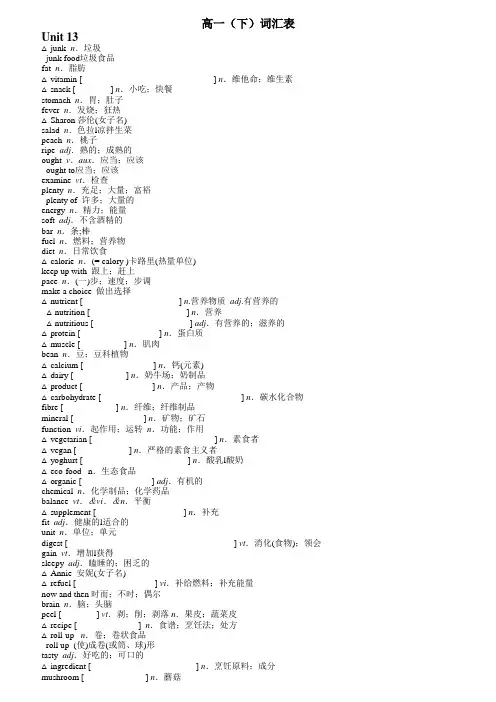
高一(下)词汇表Unit 13△junk n.垃圾junk food垃圾食品fat n.脂肪△vitamin [] n.维他命;维生素△snack [] n.小吃;快餐stomach n.胃;肚子fever n.发烧;狂热△Sharon 莎伦(女子名)salad n.色拉l凉拌生菜peach n.桃子ripe adj.熟的;成熟的ought v.aux.应当;应该ought to应当;应该examine vt.检查plenty n.充足;大量;富裕plenty of 许多;大量的energy n.精力;能量soft adj.不含酒精的bar n.条;棒fuel n.燃料;营养物diet n.日常饮食△calorie n.(= calory )卡路里(热量单位)keep up with 跟上;赶上pace n.(一)步;速度;步调make a choice 做出选择△nutrient [] n.营养物质adj.有营养的△nutrition [] n.营养△nutritious [] adj.有营养的;滋养的△protein [] n.蛋白质△muscle [] n.肌肉bean n.豆;豆科植物△calcium [] n.钙(元素)△dairy [] n.奶牛场;奶制品△product [] n.产品;产物△carbohydrate [] n.碳水化合物fibre [] n.纤维;纤维制品mineral [] n.矿物;矿石function vi.起作用;运转n.功能;作用△vegetarian [] n.素食者△vegan [] n.严格的素食主义者△yoghurt [] n.酸乳l酸奶△eco-food n.生态食品△organic [] adj.有机的chemical n.化学制品;化学药品balance vt.&vi.&n.平衡△supplement [] n.补充fit adj.健康的l适合的unit n.单位;单元digest [] vt.消化(食物);领会gain vt.增加l获得sleepy adj.瞌睡的;困乏的△Annie 安妮(女子名)△refuel [] vi.补给燃料;补充能量now and then 时而;不时;偶尔brain n.脑;头脑peel [] vt.剥;削;剥落n.果皮;蔬菜皮△recipe [] n.食谱;烹饪法;处方△roll-up n.卷;卷状食品roll up (使)成卷(或筒、球)形tasty adj.好吃的;可口的△ingredient [] n.烹饪原料;成分mushroom [] n.蘑菇△chop vt.剁碎;砍steam vt.蒸 vi.蒸发boil vt.&vi.煮沸bacon [] n.咸肉;熏肉lettuce [] n.生菜,莴苣mixture n.混合;混合物spoonful n.一匙的量slice [] vt.&vi.将某物切成薄片n.片;薄片;切片△ dice [] vt&vi.将某物切成小方块; 切成丁n.小方块△ stir [] vt.搅拌;搅动Unit 14theme [] n.主题△Mardi Gras 美国和巴西的一个狂欢节日,直译为“油腻的礼拜二”dress up 盛装;打扮;装饰parade [] n.游行;行进△ Ramadan [] n.斋月△Arabic adj.阿拉伯人的(尤指其语言或文学)holy [] adj.神圣的;神的Easter n.(耶稣)复活节symbol [] n.象征;符号;记号△bunny [] n.<儿>兔子fighting n.战斗;打仗conflict [] n.斗争;战斗;冲突argument n.争论;辩论△destruction [] n.破坏;毁灭opinion n.意见;看法in one’s opinion 按照……的看法major adj.重大的;主要的probably adv.大概;很可能△Kwanzaa n.宽扎节△Swahili n.斯瓦希里语(人)honour [] vt.(=honor)尊敬;给以荣誉ancestor [] n.祖先;祖宗principle [] n.法则;原则;原理△ unity [] n.团结;联合;统一△community [] n.团体;社会nation n.国家;民族△self-determination n.自主;自我决定purpose n.目的;意图creativity [] n.创造性(力)faith n.信任;信念; 忠实commercial [] adj.商业的;贸易的joy n.欢乐;喜悦;乐趣light vt.(lit,lit;lighted,lighted)点燃;照亮similar adj.相似的generation n.一代(人)play a trick on sb 开某人玩笑;欺骗某人salute [] vi.行礼致敬;敬礼kiss vt&n.吻cheek n.面颊; 脸蛋nod vi&n.点头celebration n.庆祝;庆典△reminder n.提醒的人(物); 暗示respect vt.尊敬;尊重△Mexico n.墨西哥(北美洲国家)△skeleton [] n.(动物的)骨架;骨骼gift n.礼物;天赋cycle n.周期;循环vi.骑自行车fool n.愚人;白痴vt.愚弄;欺骗take in 欺骗;摄取invitation [] vt.邀请;邀请信△occasion [] n.场合; 时机; 机会Unit 15△mystery [] n.谜;神秘的事物△mysterious [] adj.神秘的△footprint n.足迹;脚印△ladder n.梯子△scary [] adj.引起惊慌的;吓人的dormitory [] n.宿舍△Jeanne 让娜(女子名)△Mathilde Loisei 玛蒂尔德·卢瓦泽尔recognize vt.识别;认出surely adv.想必;确实;一定diamond n.钻石explain n.解释;说明△Pierre 皮埃尔(男子名)ball n.舞会jewellery n.(jewelry)珠宝;首饰;珠宝类franc n.法郎 (法国、比利时和瑞士的货币单位)continue vt.&vi.继续call on 访问;号召;邀请lovely adj.好看的;可爱的bring back 拿回来;使恢复day and night 日日夜夜地pay off 还清(债务等);付清debt n.债务;欠款precious [] adj.宝贵的;贵重的;珍爱的at most 至多positive [] adj.肯定的;积极的attend vt.出席;参加;上(大学等)△rehearse [] vt. 预演;排演earn vt.赚得;挣得lecture n.演讲;讲课silly adj.缺乏常识(或理智)的;傻的mosquito [] n.蚊子bat n.蝙蝠;(网球、乒乓球等的)球拍△Shakespeare 莎士比亚(16世纪英国剧作家、诗人)author n.作者;作家act out 把……表演出来;把……付诸行动besides adv.此外 prep.除……之外△alien [] n.外星人 adj.外国的;相异的outline n.轮廓;要点;概要plot n.(小说的)情节;结构quality n.品质;质量;性质Unit 16△pro [] n.赞成△con [] n.反对experiment n.实验;试验glove [] n.手套gas n.气体liquid n.液体;液态物advantage n.有利条件;优点disadvantage n.不利;不利条件application [] n.应用;实施;用途△maglev [] n.&adj.磁力悬浮列车(的) engine n.发动机nuclear [] adj.核子的;原子能的△economy [] n.经济;节约comfort n.舒适;安慰unnecessary adj.不必要的;多余的successful adj.成功的;胜利的△Benjamin Franklin 本杰明·富兰克林(美国科学家)conduct vt.实施;管理;指挥;引导n.行为;操行a number of 若干;一些lightning [] n.闪电thunderstorm [] n.雷雨;雷暴△condenser [] n.电容器;冷凝器△shed n.小屋;牲口棚string n.线;细绳charge vt.使充电;要(价);控告;攻击electric adj.电的;导电的;电动的shock n.电击;打击;震动a great deal of 很多的;大量的prove vt.证明;证实tear vt.&vi.(tore,torn) 撕扯;撕裂;撕毁frame n.结构;框架handkerchief n.手帕control vt.&n.控制;支配;管理sharp adj.锐利的;轮廓清晰的;灵敏的foot n.英尺fasten [] vt.扎牢;拴紧;使固定△ribbon n.缎带;丝带;带状物△thundercloud n.雷雨云pick out 挑出;辨别出sense n.感觉;感官test vt.& n.测试;试验;检验test on 在……(身上)做试验shampoo [] n.洗发精;洗发香波skin n.皮肤;(植物、果实等的)外壳drug n.药;麻药;麻醉药activist [] n.激进主义分子;行动主义分子doubt n.& vt.怀疑;疑惑一cruel adj.残酷的;令人痛苦的△painkiller n.止痛药;解痛物view n.观点l风景conclusion [] n.结束;结论Unit 17△ Madame Curie 居里夫人(法国籍波兰科学家)△Pearl S. Buck 赛珍珠(美国女作家)△Mother Teresa 特丽萨嬷嬷inspire vt.鼓舞;感动;激发;启示admire vt.钦佩;赞赏generous [] adj.慷慨的;大方的cheerful adj.愉快的;高兴的mean adj.卑鄙的;吝啬的tense adj.紧张的;拉紧的dull [] adj.迟钝的;无趣的;呆滞的dishonest adj.不诚实的champion [] n.冠军;得胜者;斗士△the South Pole南极△the North Pole 北极△polar [] adj.两极的;极地的△Antarctica [] n.南极洲mile n.英里△sled n.雪橇around the corner (常与just连用) 即将来临;在拐角处stormy adj.暴风雨的;多风暴的;激烈的threaten [] vt.恐吓;威胁;预示(危险)die down 变弱;平息;消失△thaw [] vt. 解冻△slope n.斜坡;斜面;倾斜bottom n.底部;尽头optimistic [] adj.乐观的△expedition [] n.远征;探险队workday n.一天的工作时间;工作日△woozy [] adj.眩晕的;虚弱的somehow adv.以某种方式;莫明其妙地;不知怎么地shelter n.掩蔽;掩蔽处;避身处regret n. 遗憾;悔恨;抱歉;歉意vt. 为……感到遗憾;后悔△solo [] adj.单独的extreme [] adj.极端的;极度的;偏激的extremely adv.非常地;极其地climate [] n.气候value vt.重视;估价;评价 n.价值;价格△Helen Thayer 海伦·塞娅pianist [] n.钢琴家;钢琴演奏者△Oprah Winfrey 欧普拉·温弗丽△personality [] n.人物;个性;人格come to terms with 甘心忍受 (不愉快的处境)bother [] vt.烦扰;打扰vi.烦恼;操心 n.麻烦;烦扰;不便fame n.名声;名望promise n.&vt. (有) 前途;允诺;答应kindergarten [] n.幼儿园adj.幼儿园的;启蒙阶段的hardship n.困苦;艰难;贫困bear vt. (bore,borne) 忍受;承受;负起△discipline [] n.纪律;学科△self-improvement n.自我改善;自我修养scholarship [] n.奖学金;学问graduation n.毕业;毕业典礼Chicago n.芝加哥(美国城市)autograph [] n.亲笔签名;手稿Unit 18△Winfield n.温菲尔德(文中虚构的地名)fisherman n.渔民;钓鱼人great-grandfather n.(外)曾祖父northeastern adj.(在)东北的;向东北的;来自东北的great-grandmother n.(外)曾祖母central adj.中央的;中心的coast n.海岸surround vt.&vi.包围;围绕△Tasman Sea n.塔斯曼海△Wellington n.惠灵顿(新西兰首都)△Auckland n. 奥克兰(新西兰港市)△Christchurch n.克赖斯特彻奇 (新西兰港市)△Queenstown n.昆士城(新西兰城市)mild [] adj.温和的;不严厉的△subtropical [] adj.亚热带的bay n.海湾harbour n.(=harbor) 海港△landscape n.风景;山水画;地形;前景volcano [] n.火山spring n.泉heat n.热;热度;压力 vt.&vi.加热surface n.表面;外表△kiwi [] n.几维鸟;(口)新西兰人△Maori n.(新西兰的)毛利人;毛利语adj.毛利人的;毛利语的△Aotearoa 奥蒂蜀;奥特亚罗瓦(毛利语:长白云之乡)△Polynesia n.波利尼西亚(中太平洋的岛群)rat n.老鼠;耗子;讨厌鬼settle vt.使定居;解决;使平静vi.安家;定居;停留settler n.移民者;定居者mainly adv.大体上;主要地voyage [] n.航行;(尤指)航海;航天△Dutchman n.荷兰人△Abel Tasman 亚伯·塔斯曼possession n.拥有;占有;财产(常用复数)take possession of 占有;占领bold [] adj.用粗体印刷的;大胆的;突出的paragraph n.段落△heading n.(书籍等篇页、章节上端的)标题△location [] n.地方;位置grassland n.草原;草地△grassy adj.盖满草的;长满草的△rocky adj.岩石的;多岩石的△sandy adj.含沙的;多沙的△hilly adj.多小山的;陡的mountainous adj.多山的;如山的;巨大的surprising adj.令人惊奇的,使人吃惊的secretary n.秘书;书记;文书percent n.百分比;百分数make up 组成;构成△marae n.毛利人集会地wedding n.婚礼;婚宴△burial [] n.葬礼;埋葬conference n.会议;讨论会relation n.亲属;亲戚;关系;联系agricultural adj.农业的;农艺的cattle n.牛;家养牲畜export [] n.输出;出口(商品)[] vt.输出lamb [] n.小羊;羔羊turn to 开始干;求助于;转向ship vt.&vi.用船运;装运;乘船sail vt.&vi.航行;乘船旅行go sailing 驾船航行;进行帆船运动cottage n.村合;小别墅seaside n.海滨(胜地);海边 adj.海边的;海滨的camp vt.&vi.使宿营;宿营go camping 宿营△region [] n.区域;地方△ethnic [] adj.少数民族的;种族的Unit 19△produce n.产量;产物;农产品protection n.保护;防卫△dike [] n.堤坝;排水沟△sugarcane [] n.甘蔗△arable [] adj.可耕的;适于耕种的technique n.技术;技巧;方法△fertilisation [] n.施肥;授精△fertiliser [] n.肥料;化肥△fertilise [] vi.&vt.施肥;使肥沃irrigation n.灌溉;冲洗△modernise [] vt使现代化pump n.泵;抽水机 vt.(用泵)抽(水);抽吸seed n.种子;萌芽△seedbed n.苗床technical adj.技术的;技术上的import [] n.进口;引入;进口货[] vt.& vi.进口;输入△delegation [] n.代表团;授权;委托production n.总产量;产品;生产depend on 依靠;信赖;取决于method n.方法;办法;方法论△shortage [] n.不足;缺少△greenhouse n.温室;花房root n.根;根部insect [] n.昆虫△GM = genetically modified转基因△genetically adv.由基因决定的;与遗传有关的△gene n.基因;(遗传)因子△modify vt. 更改;修改;修饰tobacco n.烟叶;烟草制品;抽烟△watermelon n.西瓜△soybean n.大豆△seedless adj.无子的golden adj.金色的;黄金的tie n.领带;领巾;鞋带discovery n.发现;被发现的事物garden vt.& vi.从事园艺;栽培花木gardening n.园艺;造园术;园林工作gardener n.园丁wisdom n.智慧;学识;明智的行为practical adj.实际的;实践的;实用的guide n.向导;有指导意义的事物vt.指导;管理;领带firstly adv.第一;首先sow vt.&vi.播种;散布;使密布condition n.条件;状况soil n.土壤;土地;国土weed n.野草;杂草 vt.除草;铲除remove vt. 移动;搬开△plough [] vt.耕;犁耕 n.犁and so on 等等 (表示列举未尽)sunflower n.向日葵△proverb [] n.谚语;俗语;常言△sunset n.日落;衰落时期 (尤指人的晚年)△morrow [] n.(古) (诗) 次日;翌日;早晨△cackle [] vi.(鸡等下蛋后)咯咯叫;咯咯地笑Unit 20humour n.(=humor) 幽默;诙谐humourous adj.(=humorous)富于幽默感的;滑稽的△twister [] n.缠绕者;难事;难题tongue twister 绕口令bitter adj.苦的;痛苦的△witch n.女巫;老丑妇chalk n.粉笔couple n.(一)对;(一)双;夫妇minister n.基督教传教的牧师;部长;大臣△comedian [] n.喜剧演员;滑稽演员△German n.德语;德国人adj.德国(人)的;德语的circus [] n.马戏团(场);杂技团(场)△clown [] n.小丑;粗鲁愚蠢的人intend vt. 想要;打算;意指△cross—dressing n.穿着异性服装stage n.舞台;阶段;时期△Dustin Hoffman 达斯汀·霍夫曼(美国著名影星)△stereotype n.模式化的形象(思维,人物等);老套nationality n.国籍;国家;部落;民族certain adj.确定的;无疑的;某(种)make fun of 取笑;嘲笑amuse vt.使发笑;使愉快laughter n.笑;笑声accent [] n.口音;腔调;重音actually adv.实际上;事实上△sketch [] n.短剧;略图;草图typical [] adj.典型的;象征性的△crosstalk n.相声tradition [] n.传统date back 回溯至make use of 利用某事物(某人)rapid adj.迅速的;快的△rhyme [] vi.押韵;作诗;韵律和谐△applaud [] vi.拍手喝彩;称赞;赞同appreciate [] vt. 赏识;鉴赏;感激△fluent [] adj.流利的;流畅的exist [] vi.存在;生存phrase n.词组;短语suffer vi.经历或遭受;忍受△peasant n.农民operate vi.&vt.运转;操作be on good terms (with sb) (与某人)关系好direction n.方向;指导;(常用复数)指示;说明(书)brake vt.&vi.刹车 n.闸;刹车cyclist [] n.骑脚踏车的人fortunately adv.幸运地bicycle n.自行车;脚踏车drive off 把(车)开走;赶走;击退silence n.寂静;沉默;静默 vt.使沉默;使安静look on…as 把……看作rude adj.粗鲁无礼的;残暴的confuse vt.使迷惑;打乱;混淆confused adj.困惑的;烦恼的Unit 21unfair adj.不公正的;不公平的customer n.顾客;主顾avoid vt.避免;消除△contact [] n.接触;联系[] vt.接触;联系△frown [] vi.皱眉;不许可;不同意△lean [] vi.倚靠;倾斜suitcase n.手提箱;小提箱ahead adj.&adv.在前;向前;提前ahead of (在空间或时间上比某人、某物)更前;更早give sb. a hand 给某人帮助manage vt.&vi.做成(某事);管理;经营fold [] vt.折叠;合拢;抱住vary [] vt.改变;使多样化 vi.变化;不同△disrespectful adj.失礼的;无礼的△thumb [] n.拇指△index [] n.食指;索引△Brazil [] n.巴西(南美国家)crazy adj.疯狂的;狂热的;(建筑等)不安全的△Bulgaria [] n.保加利亚(欧洲国家) △Iran [] n.伊朗(亚洲国家)part vt.&vi.分开;分离△Russia n.俄罗斯(欧洲国家)firm adj.(指动作)稳定而有力的;牢固的。
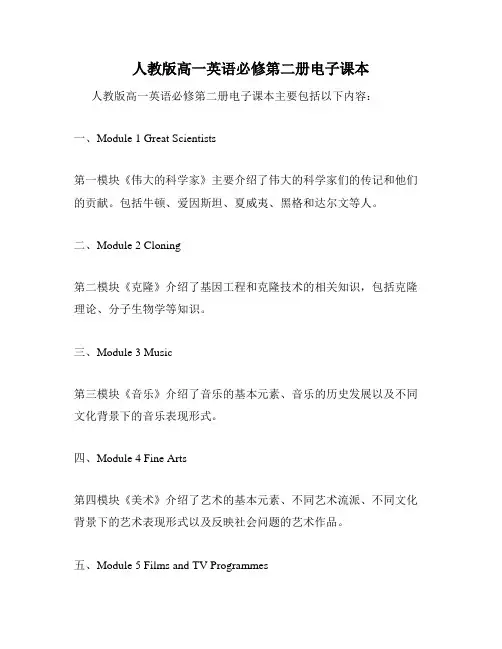
人教版高一英语必修第二册电子课本人教版高一英语必修第二册电子课本主要包括以下内容:
一、Module 1 Great Scientists
第一模块《伟大的科学家》主要介绍了伟大的科学家们的传记和他们的贡献。
包括牛顿、爱因斯坦、夏威夷、黑格和达尔文等人。
二、Module 2 Cloning
第二模块《克隆》介绍了基因工程和克隆技术的相关知识,包括克隆理论、分子生物学等知识。
三、Module 3 Music
第三模块《音乐》介绍了音乐的基本元素、音乐的历史发展以及不同文化背景下的音乐表现形式。
四、Module 4 Fine Arts
第四模块《美术》介绍了艺术的基本元素、不同艺术流派、不同文化背景下的艺术表现形式以及反映社会问题的艺术作品。
五、Module 5 Films and TV Programmes
第五模块《电影和电视节目》介绍了电影和电视节目的发展历程、不同类型的电影和电视节目以及电影和电视节目对社会的影响等方面的知识。
以上是人教版高一英语必修第二册电子课本的主要内容列表,其中涉及了自然科学、人文文化、艺术和娱乐等方面的内容,是一本涵盖广泛、内容丰富的英语教材。
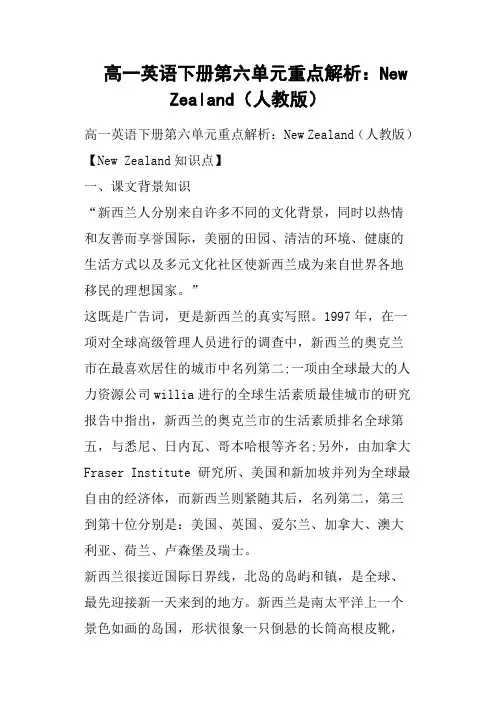
高一英语下册第六单元重点解析:NewZealand(人教版)高一英语下册第六单元重点解析:New Zealand(人教版)【New Zealand知识点】一、课文背景知识“新西兰人分别来自许多不同的文化背景,同时以热情和友善而享誉国际,美丽的田园、清洁的环境、健康的生活方式以及多元文化社区使新西兰成为来自世界各地移民的理想国家。
”这既是广告词,更是新西兰的真实写照。
1997年,在一项对全球高级管理人员进行的调查中,新西兰的奥克兰市在最喜欢居住的城市中名列第二;一项由全球最大的人力资源公司willia进行的全球生活素质最佳城市的研究报告中指出,新西兰的奥克兰市的生活素质排名全球第五,与悉尼、日内瓦、哥本哈根等齐名;另外,由加拿大Fraser Institute 研究所、美国和新加坡并列为全球最自由的经济体,而新西兰则紧随其后,名列第二,第三到第十位分别是:美国、英国、爱尔兰、加拿大、澳大利亚、荷兰、卢森堡及瑞士。
新西兰很接近国际日界线,北岛的岛屿和镇,是全球、最先迎接新一天来到的地方。
新西兰是南太平洋上一个景色如画的岛国,形状很象一只倒悬的长筒高根皮靴,距澳大利亚1600公里,新西兰主要由北岛和南岛组成,库克海峡将两岛分开,还有许多较小的岛屿,陆地总面积为270,500平方公里,面积大小与日本及英国相仿,但人口密度远低于后者。
由于新西兰的大部分出口产品是农产品,人们通常认为新西兰是一个农业国家,实际上新西兰是一个高度城市化的国家,百分之八十五的人口生活在城镇里,大多数人就业在工业、商业或服务业。
新西兰拥有着许多令人激动的自然景观,从冰川到雨林,从峡湾到温泉,从火山到峡谷,从南阿尔卑斯山动人的景观到岛屿湾美丽的海岸线,更让人惊奇的是,将近三分之一的新西兰国土是国家公园或自然保护区,新西兰被誉为世界上最后一处“天堂”。
关于历史,波利尼夕亚定居者约在公元十世纪最先来到新西兰(毛利过名为“长白云之乡)。
到公元十二世纪,全国受青睐的地区已分布了许多定居点:1642年,荷兰航海家阿贝尔.塔斯曼发现了长白云之乡,并以荷兰一个地区的名字命名这块土地为,他绘制了部分西海岸的区的地图,但并未在此登陆;1769年,英国海军舰长詹姆斯.库克及船员成为首先踏足新西兰土地的欧洲人,随后,捕捞海报和鲸鱼的人们也来到这里,新西兰的国家标志是不会飞的土生“几维鸟”,有时“几维”被用作新西兰的同义语。
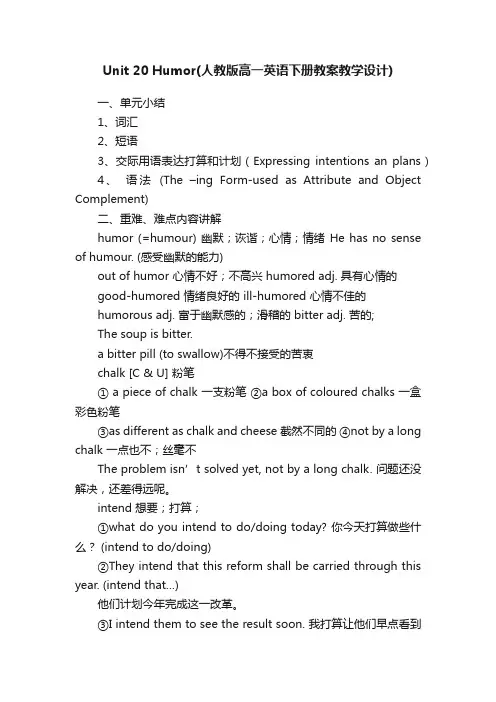
Unit 20 Humor(人教版高一英语下册教案教学设计)一、单元小结1、词汇2、短语3、交际用语表达打算和计划(Expressing intentions an plans)4、语法(The –ing Form-used as Attribute and Object Complement)二、重难、难点内容讲解humor (=humour) 幽默;诙谐;心情;情绪 He has no sense of humour. (感受幽默的能力)out of humor 心情不好;不高兴 humored adj. 具有心情的good-humored 情绪良好的 ill-humored 心情不佳的humorous adj. 富于幽默感的;滑稽的 bitter adj. 苦的;The soup is bitter.a bitter pill (to swallow)不得不接受的苦衷chalk [C & U] 粉笔① a piece of cha lk 一支粉笔②a box of coloured chalks 一盒彩色粉笔③as different as chalk and cheese 截然不同的④not by a long chalk 一点也不;丝毫不The problem isn’t solved yet, not by a long chalk. 问题还没解决,还差得远呢。
intend 想要;打算;①what do you intend to do/doing today? 你今天打算做些什么? (intend to do/doing)②They intend that this reform shall be carried through this year. (intend that…)他们计划今年完成这一改革。
③I intend them to see the result soon. 我打算让他们早点看到结果。
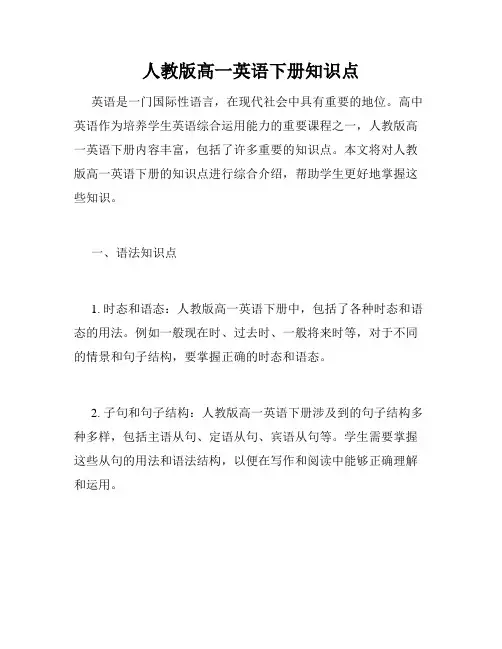
人教版高一英语下册知识点英语是一门国际性语言,在现代社会中具有重要的地位。
高中英语作为培养学生英语综合运用能力的重要课程之一,人教版高一英语下册内容丰富,包括了许多重要的知识点。
本文将对人教版高一英语下册的知识点进行综合介绍,帮助学生更好地掌握这些知识。
一、语法知识点1. 时态和语态:人教版高一英语下册中,包括了各种时态和语态的用法。
例如一般现在时、过去时、一般将来时等,对于不同的情景和句子结构,要掌握正确的时态和语态。
2. 子句和句子结构:人教版高一英语下册涉及到的句子结构多种多样,包括主语从句、定语从句、宾语从句等。
学生需要掌握这些从句的用法和语法结构,以便在写作和阅读中能够正确理解和运用。
3. 名词性从句:人教版高一英语下册也包括了名词性从句的知识点。
名词性从句在句子中可以作主语、宾语、表语和同位语等,学生需要了解名词性从句的用法和特点。
4. 定语从句:人教版高一英语下册中,定语从句是一个重要的语法知识点。
定语从句主要用来修饰名词,在句子中起到定语的作用。
要注意定语从句的引导词和关系代词的使用。
二、阅读技巧1. 阅读理解:人教版高一英语下册的课文和阅读材料中,包括了大量的阅读理解题目。
学生需要掌握阅读理解的技巧,如快速浏览、找关键词等,以便能够准确理解文章内容,并回答相关问题。
2. 阅读技巧:人教版高一英语下册中的课文和文章还包括了一些生词和难句。
学生需要学会使用词典和其他工具来解决这些问题。
此外,学生还应该注意文化差异和背景知识,以便更好地理解文章意思。
三、单词和词组1. 单词记忆:人教版高一英语下册的单词量较大,学生需要掌握并记忆这些单词的拼写、发音和词义,以便在阅读和写作中能够应用。
2. 常用词组:人教版高一英语下册中也包括了一些常用的词组,如固定搭配、习惯用法等。
学生需要熟练掌握这些词组的用法,以便在英语交流中更加流利和自然。
四、口语和写作技巧1. 口语表达:人教版高一英语下册中的口语表达是培养学生口语能力的重要部分。
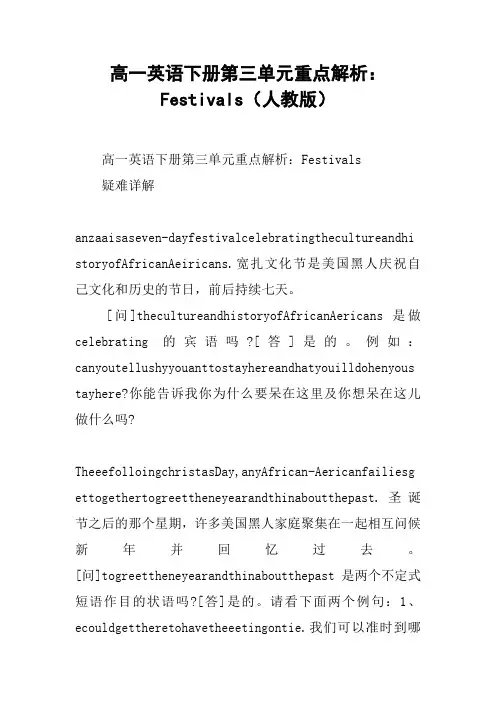
高一英语下册第三单元重点解析:Festivals(人教版)高一英语下册第三单元重点解析:Festivals疑难详解anzaaisaseven-dayfestivalcelebratingthecultureandhi storyofAfricanAeiricans.宽扎文化节是美国黑人庆祝自己文化和历史的节日,前后持续七天。
[问]thecultureandhistoryofAfricanAericans是做celebrating的宾语吗?[答]是的。
例如:canyoutellushyyouanttostayhereandhatyouilldohenyous tayhere?你能告诉我你为什么要呆在这里及你想呆在这儿做什么吗?TheeefolloingchristasDay,anyAfrican-Aericanfailiesg ettogethertogreettheneyearandthinaboutthepast.圣诞节之后的那个星期,许多美国黑人家庭聚集在一起相互问候新年并回忆过去。
[问]togreettheneyearandthinaboutthepast是两个不定式短语作目的状语吗?[答]是的。
请看下面两个例句:1、ecouldgettheretohavetheeetingontie.我们可以准时到哪儿开会。
2、Theboysaidslolytoletenoclearlyabouthathadhappened.哪个小孩讲得和年慢目的是让我对所发生的事情一目了然。
anzaaasbornin1966,henDraulanaarengacreatedanefestiv alsothatAfrican-Aericansouldbeabletocelebratetheirh istoryandculture.宽扎文化节诞生于1966年,当时,毛拉.卡伦格博士创建了一个新的节日以便美国黑人能够庆祝他们的历史和文化。
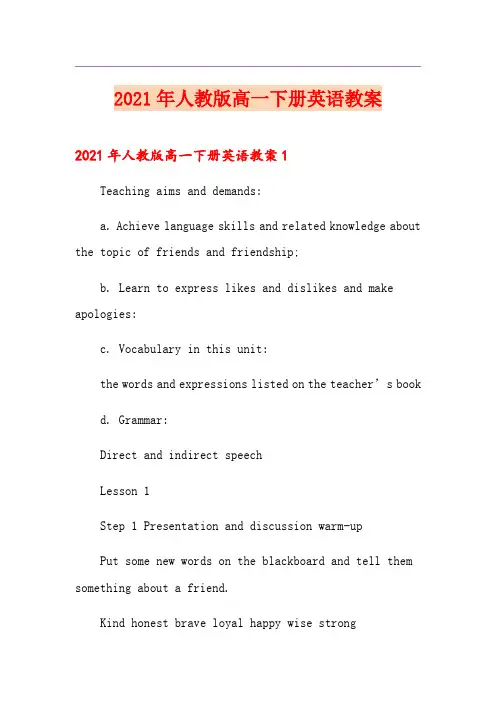
2021年人教版高一下册英语教案2021年人教版高一下册英语教案1Teaching aims and demands:a. Achieve language skills and related knowledge about the topic of friends and friendship;b. Learn to express likes and dislikes and make apologies:c. Vocabulary in this unit:the words and expressions listed on the teacher’s bookd. Grammar:Direct and indirect speechLesson 1Step 1 Presentation and discussion warm-upPut some new words on the blackboard and tell them something about a friend.Kind honest brave loyal happy wise strongbeautiful handsome rich smart funnyThen ask some questions around the class and discuss with them.What should a good friend be like?What qualities should a good friend have?Should they be funny, smart and strong?Step 2 ReadingAsk the students to read the dialogue in the part SPEAKING. Ask some questions:1.What doesn’t John like?2.What does Joe think of music and skiing?And then fill in the form on page 3.Then ask the students to express their ideas freely. Encourage the students to say more about friends.Step 3ListeningAsk the students to listen to the tape and fill in the blanks in the listening part.Step 4 Talking/PracticeAsk the students to page 85. Make a similar dialogue as in exercise 2.Some useful expressions :Why did you…? Why didn’t you…? You said that you would…Please forgive me. You promised to … I’m very sorry…It won’t happen again. I forgot.Step 5 HomeworkFinish Exercise 3 in the workbook.Lesson2Step1 RevisionAsk several students to present a speech about friends as a revision.Step 2 Pre-readingPresent the students a picture to illustrate the situation on a lonely island. Ask them to list three items in the box and ask them to give the reasons using the sentences listed on page3.Step 3 ReadingBefore asking the students to read the text, first give the students a brief introduction about Tom Hanks, his films and the film Cast Away.Then students read the text, and answer the following questions.1.How does Chuck Noland come to a deserted island?2. In order to survive on the island alone, what does he need to learn?3. What does he understand at last?4. For us, what lesson we can learn from Chuck?At the same time explain the language points if necessary.Step 4 Post-readingDiscuss the following questions in the PartPOST-READING.Step 5 HomeworkPrepare a talk about Tom Hanks or something about one of his film.Lesson3Step 1 RevisionGet the students to give a talk about Tom Hanks or something about one of his films.Step 2 Language StudyAsk the students fill in the blanks with proper words.Step 3 GrammarIllustrate to the students the use of Direct and Indirect Speech.Then ask the students to do the exercise in the Part Grammar on P5.Step 4 PracticeAsk the students to act the exercise2 in the part Grammar out.Step 5 HomeworkAsk the students to finish the exercise2 in their workbook.Lesson4Step 1 RevisionCheck the homework.Step 2 PresentationPresent simples of e-mail to get the students a general idea of e-mail.Step 3 ExplanationTell the students some tips of writing an e-mail by learn the above e-mail simple.Step 4 WritingAsk the students to write an e-mail message.Step 5 HomeworkAsk the students to try to write an e-mail to their e-pal.2021年人教版高一下册英语教案2Teaching Aims and DemandsWords and PhrasesFour Skills: stomach fever ought ought to examine plenty plenty of diet keep up with make a right choice short of fit gain now and thenThree Skills: energy soft bar fuel chemical balance tasty boil mixtureSpoken English:In the clinic / seeing a doctor:What’s wrong with you?/What’s the matter with you?Lie down and let me examine you.Let me have a look.Where does it hurt?Drink plenty of water and get some rest.I’ve got a pain here. This place hurts.There’s something wrong with back/my knee/my arm.I don’t feel well.Grammar:Use of Language:1. Master the function use of language as defined above.2. Help the students to finish the tasks of listening, reading, writing, speaking presented in the book and the exercise book through using what the students have learned.Learn the text about healthy eating. Get the students know about the basic knowledge of how to eat healthily.Important points:1. Talk about different kinds of food that one favorites.2. learn the basic knowledge of healthy eating.3. learn how to say in the clinic.4. Grasp the language points and grammar in the text.Difficult points: The use of modal verbs --- had better, should and ought to.Teaching aids: computer or slider-projectorWay of Teaching: Communication way of teaching, discussion and group work.Lesson 1Step 1 Warming-UpFirst show the students some pictures of dishes and so to introduce the topic of this unit.And then show the pictures on their text books and let them to decide what is junk food and what is not.Here the students may have a short ask and answer in pairs to themselves more engaged in the topic.Step 2 ListeningLet the students listen to the tape and be prepared to answer the questions below.Step 3 SpeakingShow the students the three situations as on P2. Then ask the students to prepared a dialogue according to theexamples in pairs. Ask several pairs of students to present their dialogueAfter that list the useful expressions in their dialogue.Step 4 HomeworkPrepare for the next class.Collect some menus if possible for the next class.Lesson 2Step 1 IntroductionUsing the questions on P3 to introduce the new text.Step 2 Fast-reading1.What does the “fuel ” mean in the first paragraph?It means different kinds of materials, such as protein, Calcium that we need to keep healthy.2.What do we have to consider when we choose to buy or eat?What kinds of nutrients that the food contain.3.What made our eating habit changing?Many things: what people believe, advice from companies and stores.4. How can we feel and look fine?We ought to learn about our body and the fuel it needs to keep fit.Explain the language points if necessary.Step 3 Carefully-readingHow many parts can be pided into?Three parts.What’s the main idea of each part?1.our eating habits are changing.2.why the eating habits are changing3.the best way to develop healthy eating habits.Step 4 TalkingAsk the students to take out their menus and read them carefully. Then prepare a dialogue that may happen between a customer and a waiter/waitress.Step 5 HomeworkFinish the exercise --- Vocabulary on P5. and P72-73 Lesson 3Step 1 RevisionCheck the homework.Step 2 GrammarFirst present the students the modal sentences with Modal Verbs and ask the students to make some sentences with them.Step 3 Consolidation1 Finish the exercise on P5 and on P742Take out a piece of paper with the column “Ask ###”in order to make the students understand when you are giving advice it is better to use some sentences with had better not, and oughtnot to, shouldnot. Then read a passage as an example and afterwards list the points you have to pay attention to when you give advice.1.give advice that will really help the person.2. be polite and sincereat last get the students to finish the following practice.Step 4 HomeworkFinish the exercise 3 on P74 in the students’ workbook.Lesson 4Step 1 RevisionLet some students read their reply to the letters on P74.Step 2 ReadingRead the text on P6 and then get the students to find the main idea of it Snacks is also important . we need to learn something about snacks and the way to prepare it.Step 3 WritingAsk the students to work in pairs to write the recipe for their favourite dish.We may first give the tips on P7 as a guide.Step 4 DiscussionFirst ask the students to read the passage on P75 and then give the following questions as the topic for the students to talk: What is a couch potato?What does one have to pay special attention to in order to keep healthy? food and exercise etc.Step 5 HomeworkDo a general survey in order to learn about the differences between people’s eating habits and try to find which is healthier.。
新高考普通高中英语人教版教材目录第一部分高一上册Module 1 Nice to Meet You!Unit 1 Hello!Unit 2 Is this your pencil?Unit 3 What’s your name?Unit 4 My school dayUnit 5 Our school tripModule 2 My School LifeUnit 1 School life in the UKUnit 2 School clubsUnit 3 My first ride on a trainUnit 4 School starts at nine o’clockUnit 5 The first English lessonModule 3 TravelUnit 1 Where do you want to go?Unit 2 What’s the weather like in Beijing? Unit 3 What are you doing for vacation?Unit 4 I want to be an actor.Unit 5 Under the seaModule 4 Hobbies and InterestsUnit 1 Do you collect anything?Unit 2 What’s your hobby?Unit 3 Collecting postcardsUnit 4 Reading newspapersUnit 5 Enjoying a playModule 5 Food and Healthy HabitsUnit 1 What’s your favorite food?Unit 2 Healthy eating habitsUnit 3 Traditional Chinese medicineUnit 4 You should have a medical exam before you donate blood.Unit 5 Food for thoughtModule 6 Natural DisastersUnit 1 What’s the matter?Unit 2 EvacuationUnit 3 The power of natureUnit 4 A world of extreme weatherUnit 5 Coping with tragedy第二部分高一下册Module 7 Science and TechnologyUnit 1 Great scientistsUnit 2 Science fictionUnit 3 Let’s talk about the science museumUnit 4 I used to believe that…Unit 5 The creation of the internetModule 8 Language LearningUnit 1 Why don’t you learn to speak English? Unit 2 A trip on a four-wheelerUnit 3 Learning EnglishUnit 4 English in the futureUnit 5 Traveling around the English-speaking world Module 9 Great ChangesUnit 1 The world has changed!Unit 2 Life in the futureUnit 3 A taste of English humorUnit 4 The way we behaveUnit 5 The world in the futureModule 10 International CooperationUnit 1 AIDS in AfricaUnit 2 Working togetherUnit 3 Global warmingUnit 4 Two heads are better than oneUnit 5 A great projectModule 11 Music and ArtUnit 1 MusicUnit 2 GraffitiUnit 3 The elements of artUnit 4 Let’s watch a movieUnit 5 Looking at picturesModule 12 Sports and HealthUnit 1 Great moments in sportUnit 2 Taking risksUnit 3 Keeping in good healthUnit 4 SoccerUnit 5 Basketball附:高中英语人教版教材目录大致上分为两个部分,上下两册,每个部分中有六个模块,每个模块中有五个单元。
英语第四单元知识点1. In the 18th century, Benjamin Franklin cinducted a number of experiments in which he showed what electricity is.在18世纪,本杰明富兰克林进行了许多次关于电的实验。
[问]...in which he showed what electrivity is. in + which 引导定语从句,修饰先行词experiments。
这里which不能由that替换。
(2)...what electricity is 宾语从句,做show的宾语。
(3)A number of...“许多,大量”,接可数名词复数,谓语要用复数形式;the number of...“……的数量”谓语动词应该用单数。
例如:A number of peasants are working inthe fields with the sun burning in the shy. 许多农民顶着烈日在地里耕作。
2. Having realized that I could use a kite to aftract lightning.I decided to do an experiment. 当我意思到能用风筝来接收闪电后,我决定做个实验。
[问]Having realized that ... 在句子充当什么成分?[答]Having realized that ... 现在分词短语做时间状语。
(=when I had realized that I could use a kite to attract lightning, ...)3. Most kites are made of paper, but a kite made of silk will last longer in weather with rain and strong winds. 大多数风筝是由纸做的,但用丝绸制的风筝在雨和大风的天气中持续的时间会长一些。
高一下册英语书1)common表示"普通的,常见的;共同的;共有的;一般的"。
并作名词,则表示"(公有)草地"。
becommonknowledge人所共知。
thecommontouch平易近人的美德commonground共同的意见,利益,目标等commonsense常识,情理区别common,ordinary,usual,general,normalcommon指因许多事物或许多人所共同具有而常见的意思。
ordinary指由于与通常事物性质和标准相同,因而变得平时,并无奇特之处。
usual"通常的,惯常的",含有"随集体风俗或个人习惯而常常发生"之意。
normal意指"正常的",特别强调正常性。
2)technology和techniquetechnology就是技术的总称,不是指一项一项的具体内容技术,就是不可数名词。
technique表示"某种技能,技巧",指一项一项的技术技巧,是可数名词。
3)simple表示"简单明了,不复杂,朴素,不浮华"。
还可以则表示"天真的,率为真的;并无经验的,天真的"。
4)dealWhether及物动词,意为"经营",在所经营的对象前面提in,多指经营货物,公债,股票等。
dealwith常表示的意思有:处置,化解,精心安排;对待,对付,主语是人;谈论,牵涉。
deal作及物动词,表示"分发,对待"。
dealsbablow压制某人作名词,表示"买卖,交易,协议,政策,对待"。
均是可数名词。
5)race表示"种族"。
则表示"家族,血统,门第,世系"等时就是不可数名词。
theraces表示"_会,赛狗会"。
人教版高一英语下册Humour学问点人教版高一英语下册Humour学问点【Humour学问点】重点句型解析1.I do not think everybody will find my kind of humour funny.我认为不是每个人都觉得我的幽默是滑稽可笑的.(1)这是一个含有 that 引导的宾语从句的复合句.请留意汉语与英语在表示否定时位置的不同.在英语中,有一种否定转移现象,主句在形式上是否定的,而在意义上实际上是否定从句.这种状况常消逝在think,believe,imagine,suppose 等作主句谓语的句子中.e.g.I don’t suppose he cares,does he?我看他不在乎,对吧?She doesn’t believe he is at school.她认为他不在学校.(2)当主句的'谓语动词是think,believe 等与情态动词连用时,不存在否定转移.e.g.We couldn’t believe he was at home.我们真不能信任他当时在家.We didn’t believe he was at home.我们认为他不在家.(3)find+宾语+宾补,宾补可以是名词,形容词,过去分词,现在分词,动词不定式,介词短语,副词等.Will you find Mary her tennis racket?你情愿替玛丽找一找网球拍吗?We found him (to be) dishonest.我们觉得他不恳切.He found the door closed.他发觉门被关上了.He found a wallet lying on the ground.他发觉一只钱包躺在地上.I find it difficult to understand him.我觉得难以理解他.2.What comedians have in common with the players in a comedy is their way of playing with words.在喜剧中,喜剧演员同其他演员的共同之处是玩文字玩耍.(1)这是一个由what引导的主语从句,what充当have的宾语.(2)have...in common(with)意思是“与……有共同之处”.She has nothing in common with her sister.她和姐姐毫无共同之处.(3)in common 意思是“公有,公用”.They two own the factory in common.他俩共有这家工厂.3.I cycled as fast as I could.我尽可能快地骑.(1)as fast as...意思是“尽可能快地……”.as...as意思是“如同……一样”,表正面比较,第一个as为副词,修饰中间的形容词和副词,其次个as后接名词时,作介词用;接从句时是连词,从句常为比较状语从句.否定形式是not so/as...as...意思是“不如……那样……”,“没有……那么……”.It is as white as snow.像雪一样白.I am as tall as you (are).我跟你一般高.(2)cycle在本句中用作动词,意思是“骑自行车”.可用作名词,意思是“自行车,摩托车”.cyclist意思是“骑自行车的人”.e.g.I cycled in front of him.我骑车绕到他的前面.Last night,I watched a cycle race.昨晚,我观看了一场自行车竞赛.I had to brake hard and I hit another cyclist.我不得不舍命刹车,结果撞上了另一个骑车的人.4.I was still so angry that I went up to tell him what I thought of him.我照旧如此生气以至于我走上前把我对他的看法告知他.(1)so+形容词+that引导结果状语从句,意思是“如此……,以至于……”.e.g.He is so kind that I like him very much.他是如此和善,以至于我很宠爱他.(2)go up to意思是“走上前去”,由so构成的短语:go in for从事于,酷爱go all out全力以赴go against违反go ahead前进All things went well.万事大吉.【同步练习题】一.单词拼写1.Mark Twain was a________(幽默的)writer and his works always make readers laugh.2.Because of the war,many people became________(无家可归的)in Libya.3.The________(喝醉的)driver was punished severely by the police.4.The thief________(溜进)into the house without anyone noticing him.5.Seeing my arrival,he came over and________(低语)something in my ear.6.Well,youve acted________(愚蠢地)and you will pay for it.7.French has many________(多山的)regions for skiing in winter.8.Some kids are very________(挑剔的)about food,that is,they dont have a balanced diet.答案:1.humourous 2.homeless 3.drunk 4.slid5.whispered6.foolishly7.mountainous8.particular二.短语填空badly off,pick out,cut off,up to now,feel/be content with1.Certainly,when the heat comes to a certain degree,a red light will flash and the electricity will be______________automatically.2.I felt at ease with the villagers and______________my life there.3.Her house is easily______________from the rest;it has a large black gate.4.We were so______________when I was a child that we had a meat dish for dinner only on Sunday.5.I have heard nothing from him______________.答案:1.cut off 2.felt/was content with 3.picked out4.badly off5.up to now三.完成句子1.Jones was ill,so she missed her chance of______________(主演)the school play last month.2.What worries us is that this is the third time____________(电源被切断)this week.3.The picture was taken a long time ago.I wonder______________(是否能辨认出我父亲).4.Solar energy is friendly to the environment,but it hasnt been made the best of______________(直到现在).5.A lot of language learning,______________(正如发觉的那样),is happening in the first year of life,so parents should talk much to their children during that period.6.He spent four years getting a degree,______________(结果发觉)there were no jobs for graduates.答案:1.starring in 2.the electricity has been cut off 3.ifyou can pick out my father 4.up to now 5.as has been discovered6.only to find四.单元考点作文串记(一)依据提示翻译句子1.我们的英语老师有些特别(in particular)之处。
人教版高一英语下册Unit 1Moda verbcan/coud北流市明瑞高中李雪兰教学目标To hemand the uage of moda verb, eedia 、edia教学过程Steoda verbSteoda verb to tudent情态动词表示说话人的语气或对事物的态度,情态动词本身有词义,但不能单独作谓语,必须和原型动词一起构成谓语。
情态动词没有人称和数的变化。
Steoda verb and the uage of a moda verb to tudent一、常见的情态动词can, coud, ma, might, mut, ha, houd, wi , woud, need, have to 等。
(二)、常见的情态动词的基本含义及用法coud可能,会can’t/coudn’t不能不会might可以,可能ma not可能不必须一定’t不可以’t不需要to 不得不必须don’t have to 不需要woud 将会愿要应当houdn’t不应当…的疑问句中否定回答用mutn’t或can’t…的疑问句中否定回答用needn’t或don’t have to11请你…好吗?用句型:Wi/Woud/coud ou atter ater2表示请求(requet或(iion意为“可否”、“可以”。
Coud比can更有礼貌,在这里,不是表示can的过去式ou wait a moment, e favorme,coud ou te me the wa to the tationWonder if ou coud heerequetou thin I coud borrow our bieiion3can/coud have done 结构表示对过去发生的事情的“怀疑”或“不肯定”,用于问句或否定句。
Coud have done 用于肯定句时,一般表示“过去本来能完成而未完成的动作”。
Who coud/can have taen m new , but ou were too caree虚拟)4Cannot heuchCannot heeworDo ome eercie about can and coud。